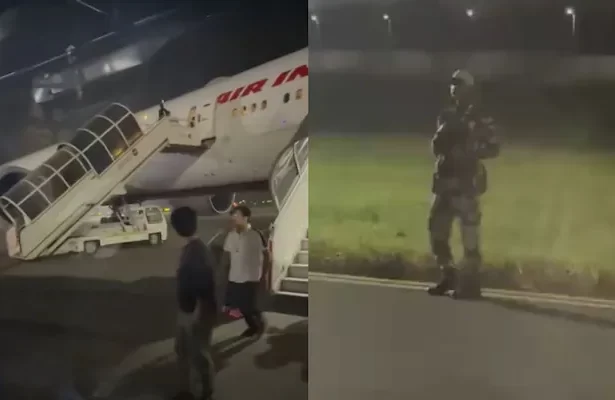In a startling incident, three international flights originating from Mumbai were disrupted due to fake security threats, leading to significant operational challenges and inconveniences for hundreds of passengers. The Bureau of Civil Aviation Security (BCAS) is actively monitoring the situation and is in the process of verifying the legitimacy of these threats. This incident serves as a reminder of the critical importance of security protocols in aviation and the potential impact of such threats on public safety and travel.
Fake Security Threats: Overview of the Incidents
On October 14, 2024, two IndiGo flights and one Air India flight received bomb threats that prompted immediate security responses. The seriousness of the situation led to extensive checks and protocols being initiated for all three aircraft. While one IndiGo flight has been cleared to continue its journey, the other two flights are still undergoing thorough security checks to ensure passenger safety.
Details of the Affected Flights
According to officials from the BCAS, all three aircraft were subjected to bomb threats, leading to an immediate call to action. An official statement confirmed, “One IndiGo plane has been given permission to fly. The two other planes will receive clearance shortly.” The swift response from security authorities underscores the importance of vigilance in the aviation sector.
Air India Flight AI119
The first incident involved Air India flight AI119, scheduled to fly from Mumbai to New York’s John F. Kennedy International Airport (JFK). Early in the morning, the flight was diverted to Indira Gandhi International (IGI) Airport in New Delhi due to a specific security alert. The decision to divert was made in accordance with protocols established by the government’s security regulatory committee, highlighting the emphasis placed on passenger safety in the face of potential threats.
Upon landing in Delhi, all passengers and crew were safely evacuated, and the aircraft was moved to an isolated runway. A bomb squad and other security agencies promptly commenced a thorough inspection of the aircraft, employing advanced security measures to ascertain the validity of the threat. An Air India spokesperson confirmed, “Flight AI119 operating from Mumbai to JFK on October 14 received a specific security alert and was diverted to Delhi. All passengers have disembarked and are at the Delhi airport terminal.”
Authorities are currently investigating the nature of the threat, and Air India is actively coordinating with security personnel to determine the next steps. While the situation remains fluid, no further updates have been provided by the airline as of now.
IndiGo Flights 6E1275 and 6E56
Simultaneously, two IndiGo flights originating from Mumbai were also affected by the security threats. Flight 6E1275, bound for Muscat, and Flight 6E56, heading to Jeddah, received similar security threats, prompting immediate safety measures to be enacted. An IndiGo spokesperson confirmed that both aircraft were relocated to isolated bays at Mumbai Airport, following standard operating procedures designed to ensure the safety of passengers and crew.
“As per protocol, the aircraft was taken to an isolated bay, and mandatory security checks were promptly initiated,” the spokesperson explained. The same protocol was followed for the second IndiGo flight, 6E56, which was also subjected to extensive security measures before being cleared for departure. The airline emphasized its commitment to maintaining safety as its top priority, reinforcing the importance of vigilance in the face of potential threats.
Fake Security Threats, Response from Authorities
The BCAS is currently investigating the nature of the threats received by the three flights. In an age where misinformation and hoaxes can spread rapidly, it is crucial for authorities to discern credible threats from false alarms to ensure the safety of the traveling public. The efficient handling of this incident reflects the rigorous security protocols established within the aviation industry, aimed at safeguarding passengers and crew from any potential harm.
As part of the investigation, officials will assess the origins of the threats and whether any individuals can be held accountable for the disruptions caused. In the wake of these incidents, authorities may also consider enhancing security measures at airports to prevent similar occurrences in the future.
The disruptions caused by these fake security threats have significant implications for the aviation industry, highlighting the ongoing challenges faced by airlines and security agencies in ensuring passenger safety. As investigations continue, both Air India and IndiGo remain dedicated to maintaining the highest security standards for their flights. Passengers affected by these incidents are encouraged to stay informed through official airline communications as the situation develops.
Furthermore, this incident serves as a reminder of the importance of public awareness regarding security threats in aviation. Travelers are encouraged to report any suspicious activities or communications they may encounter, as collective vigilance is essential for ensuring the safety of air travel. The incident not only disrupted flights but also underlined the vital role of security protocols in maintaining passenger confidence in air travel during uncertain times.


